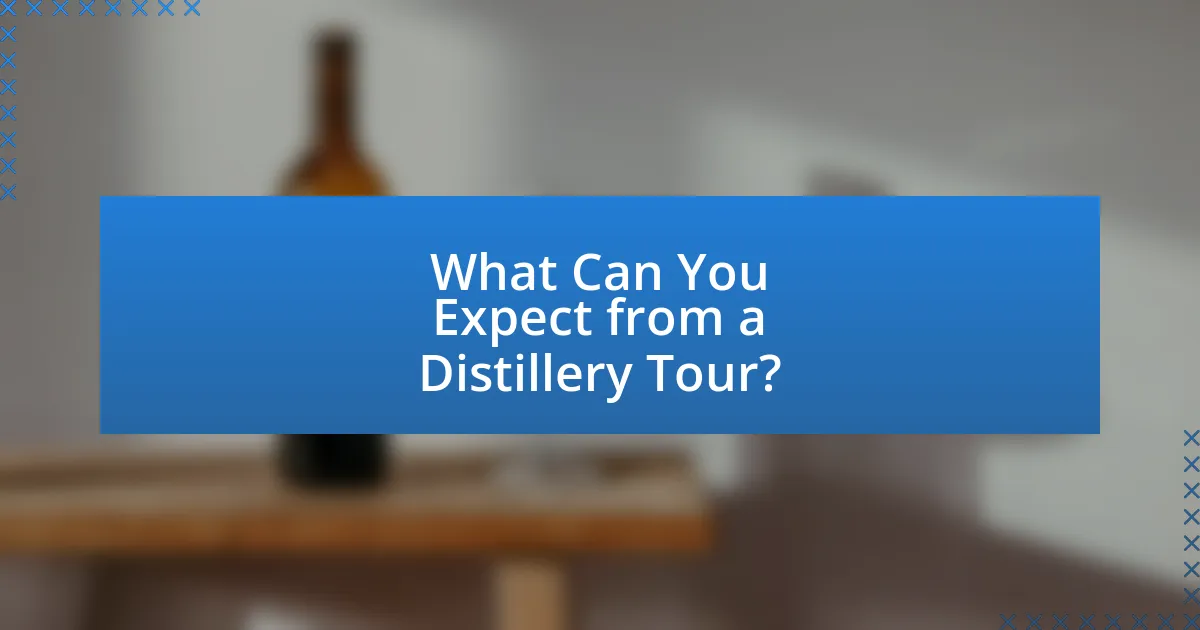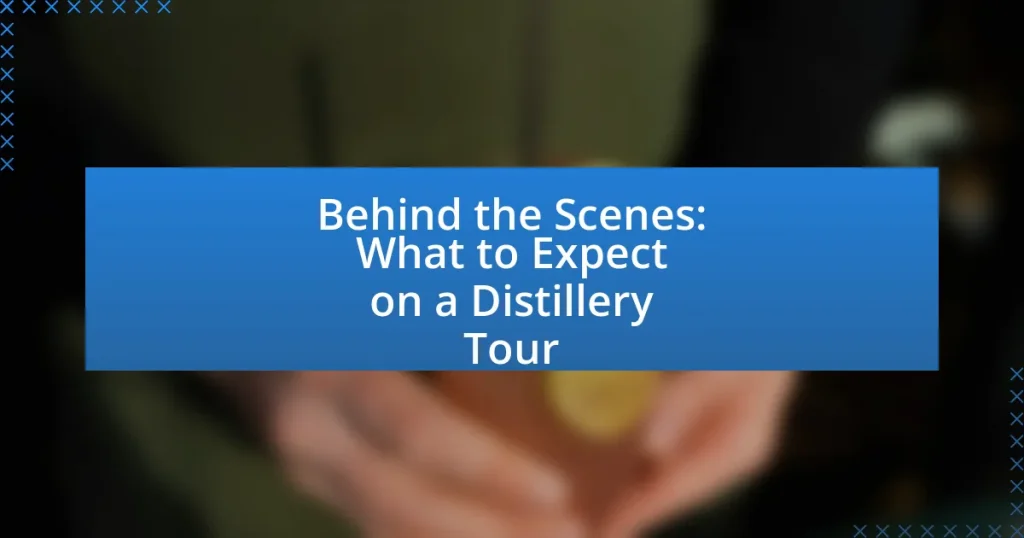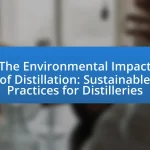The article “Behind the Scenes: What to Expect on a Distillery Tour” provides a detailed overview of the distillery tour experience, highlighting the distillation process, ingredients, and equipment involved in spirit production. It discusses how tours vary by location, emphasizing regional production methods and cultural influences. The article also explores the unique features of local distilleries, the impact of different spirit types on the tour experience, and the educational benefits gained from participating in a tour. Additionally, it offers practical tips for preparation, engagement, and maximizing enjoyment during the tour, including what to wear, questions to ask, and how to enhance tasting experiences.

What Can You Expect from a Distillery Tour?
A distillery tour typically includes an overview of the distillation process, insights into the ingredients used, and a guided exploration of the equipment and facilities. Visitors can expect to learn about the history and craftsmanship behind the spirits being produced, often with opportunities to see the fermentation tanks, stills, and aging barrels. Many tours conclude with a tasting session, allowing participants to sample the products made on-site. This structured experience is designed to educate guests about the art and science of distillation, enhancing their appreciation for the spirits.
How do Distillery Tours Vary by Location?
Distillery tours vary significantly by location due to regional production methods, local regulations, and cultural influences. For instance, Scotch whisky distilleries in Scotland often emphasize traditional methods and heritage, showcasing pot stills and aging in oak barrels, while American distilleries may focus on innovative techniques and a broader range of spirits, including bourbon and rye. Additionally, local laws can dictate the extent of tastings and tours; for example, some regions may allow on-site consumption while others do not. This diversity reflects the unique characteristics of the spirits produced in each area, such as the use of local grains or water sources, which further enhances the visitor experience.
What are the unique features of local distilleries?
Local distilleries are characterized by their emphasis on artisanal production methods, regional ingredients, and community engagement. These distilleries often utilize traditional techniques passed down through generations, which enhances the authenticity and quality of their spirits. For instance, many local distilleries source grains, fruits, or botanicals from nearby farms, ensuring that their products reflect the unique terroir of the area. Additionally, local distilleries frequently engage with their communities through events, tastings, and educational tours, fostering a strong connection with consumers. This local focus not only supports the economy but also promotes sustainable practices within the industry.
How does the type of spirit influence the tour experience?
The type of spirit significantly influences the tour experience by shaping the narrative, production methods, and tasting opportunities presented during the tour. For instance, a whiskey distillery tour may emphasize the aging process in barrels, showcasing the importance of wood selection and environmental factors, while a vodka distillery might focus on the purity of ingredients and distillation techniques. This distinction affects not only the educational content provided but also the sensory experiences offered, such as the types of aromas and flavors encountered during tastings. Additionally, the cultural and historical context surrounding each spirit type enriches the storytelling aspect of the tour, enhancing visitor engagement and understanding.
Why Should You Consider Taking a Distillery Tour?
Taking a distillery tour offers a unique opportunity to gain insight into the production process of spirits, enhancing your appreciation for the craft. Visitors can observe the intricate steps involved in distillation, fermentation, and aging, which are often accompanied by expert explanations from knowledgeable staff. This firsthand experience not only educates participants about the ingredients and techniques used but also allows for tastings that showcase the final products. Distillery tours often highlight the history and heritage of the brand, providing context that enriches the overall experience. Engaging with the distillers and learning about their passion can deepen your connection to the spirits you enjoy.
What educational benefits do distillery tours provide?
Distillery tours provide educational benefits by offering insights into the production processes of spirits, including fermentation, distillation, and aging. Participants learn about the ingredients used, such as grains and botanicals, and the science behind flavor development. Additionally, tours often include historical context about the distillery and its significance in the local culture, enhancing understanding of the craft. For example, many distilleries share information about traditional methods and innovations that have shaped their products, which can deepen appreciation for the craftsmanship involved.
How can a distillery tour enhance your appreciation for spirits?
A distillery tour enhances your appreciation for spirits by providing firsthand insight into the production process, which deepens your understanding of flavor profiles and craftsmanship. During the tour, visitors observe the ingredients, equipment, and techniques used in distillation, allowing them to connect the final product to its origins. For example, learning about the specific grains used in whiskey production or the fermentation process can reveal how these factors influence taste and quality. Additionally, engaging with knowledgeable guides often leads to discussions about the history and traditions behind the spirits, further enriching the experience. This combination of sensory engagement and educational context fosters a greater respect for the artistry involved in spirit-making.
What Are the Common Elements of a Distillery Tour?
Common elements of a distillery tour include guided walkthroughs of the production process, tastings of the spirits produced, and educational sessions about the history and techniques of distillation. During the tour, visitors typically observe equipment such as stills and fermentation tanks, which are essential for spirit production. Additionally, many distilleries provide insights into the ingredients used, such as grains or botanicals, and may offer a chance to sample various products, enhancing the overall experience. These elements are designed to engage visitors and provide a comprehensive understanding of the distillation process.
What stages of the distillation process will you see?
The stages of the distillation process you will see include fermentation, distillation, and condensation. During fermentation, yeast converts sugars into alcohol, creating a mash. In the distillation stage, this mash is heated in a still, separating alcohol from water and other components based on boiling points. Finally, in the condensation stage, the vaporized alcohol cools and returns to liquid form, ready for collection. These stages are fundamental to producing spirits and are typically demonstrated during distillery tours to illustrate the transformation from raw ingredients to finished product.
How do tastings fit into the distillery tour experience?
Tastings are integral to the distillery tour experience as they provide visitors with a direct sensory engagement with the products being produced. During a distillery tour, participants learn about the distillation process, ingredients, and history, and tastings allow them to apply this knowledge by sampling the spirits. This interactive element enhances understanding and appreciation of the craftsmanship involved. Furthermore, tastings often include guided explanations from knowledgeable staff, which can deepen the visitor’s connection to the brand and its offerings.

What Should You Know Before Attending a Distillery Tour?
Before attending a distillery tour, it is essential to understand the tour’s structure, including the types of spirits produced and the distillation process involved. Distilleries often provide insights into their unique production methods, ingredients, and history, which can enhance the experience. Additionally, many distilleries require advance reservations, and some may have age restrictions for participants. Familiarizing yourself with the distillery’s offerings and policies can lead to a more enjoyable and informative visit.
How Can You Prepare for a Distillery Tour?
To prepare for a distillery tour, research the distillery’s offerings and policies beforehand. Understanding the types of spirits produced, the history of the distillery, and any specific tour requirements, such as age restrictions or reservation needs, enhances the experience. Additionally, consider wearing comfortable clothing and shoes, as tours often involve walking and standing. Bringing a notepad or camera can help capture insights and memories. Many distilleries also recommend checking for any tasting fees or special events occurring on the day of the visit, ensuring a well-rounded experience.
What should you wear for a distillery tour?
For a distillery tour, you should wear comfortable, casual clothing and closed-toe shoes. This attire is essential because distilleries often have uneven surfaces and may involve walking through production areas where safety is a concern. Additionally, wearing layers is advisable, as temperatures can vary in different parts of the facility.
Are there any age restrictions or requirements?
Yes, there are age restrictions for distillery tours. Typically, participants must be at least 21 years old to legally consume alcohol, which is a common requirement for tours that include tastings. This age limit is enforced to comply with alcohol regulations in many regions, ensuring that all attendees are of legal drinking age.
What Questions Should You Ask During the Tour?
During a distillery tour, you should ask questions about the production process, such as “What ingredients are used in your spirits?” This question helps you understand the quality and sourcing of the materials. Additionally, inquire about the distillation methods by asking, “Can you explain your distillation process?” This provides insight into the techniques that influence flavor and quality. You should also ask about aging, for example, “How long do you age your spirits and in what types of barrels?” This reveals how aging impacts the final product. Lastly, consider asking about sustainability practices, such as “What measures do you take to ensure environmentally friendly production?” This highlights the distillery’s commitment to sustainability.
How can you engage with the tour guide effectively?
To engage with the tour guide effectively, actively participate by asking relevant questions and providing feedback during the tour. Engaging in this manner demonstrates interest and encourages the guide to share more in-depth information. For instance, asking specific questions about the distillation process or the history of the distillery can lead to richer insights and a more interactive experience. Studies show that active participation enhances learning and retention, making the tour more enjoyable and informative.
What specific aspects of the distillation process are worth inquiring about?
Key aspects of the distillation process worth inquiring about include the type of distillation method used, the temperature control during distillation, and the choice of raw materials. The distillation method, such as pot still or column still, significantly affects the flavor profile of the final product. Temperature control is crucial as it influences the separation of alcohol from other compounds, impacting purity and taste. Additionally, the selection of raw materials, including grains or fruits, determines the base flavors and characteristics of the distilled spirit. Understanding these elements provides insight into the craftsmanship and science behind distillation, enhancing the distillery tour experience.

What Are the Best Practices for Enjoying a Distillery Tour?
To enjoy a distillery tour, it is best to arrive on time, engage with the guide, and ask questions. Arriving punctually ensures that you do not miss any part of the tour, which typically includes a detailed explanation of the distillation process and the history of the distillery. Engaging with the guide enhances the experience, as they can provide insights and anecdotes that enrich your understanding. Asking questions allows for a deeper exploration of the topics discussed, making the tour more interactive and informative. Additionally, it is advisable to sample responsibly, as many distilleries offer tastings, and understanding your limits can enhance enjoyment without compromising safety.
How Can You Make the Most of Your Distillery Tour Experience?
To make the most of your distillery tour experience, actively engage with the tour guide and ask questions about the distillation process, ingredients, and history of the distillery. Engaging with the guide enhances understanding and appreciation of the craft, as they often share unique insights and anecdotes that are not included in standard presentations. Additionally, taking notes during the tour can help retain information and enhance the overall experience, as studies show that active participation improves memory retention. Finally, sampling the products at the end of the tour allows for a practical understanding of the flavors and techniques discussed, making the experience more immersive and enjoyable.
What tips can enhance your tasting experience?
To enhance your tasting experience during a distillery tour, focus on engaging your senses fully. Start by taking the time to observe the color and clarity of the spirit, as visual cues can indicate quality and character. Next, swirl the glass gently to release aromas, then take a moment to inhale deeply, allowing the scents to inform your palate. When tasting, take small sips to appreciate the flavors and textures, and consider the finish, which reveals the complexity of the spirit. Additionally, staying hydrated and cleansing your palate with water or neutral foods between tastings can prevent flavor fatigue and enhance your overall experience. These practices are supported by sensory evaluation techniques used in professional tasting environments, which emphasize the importance of a multi-sensory approach to flavor appreciation.
How should you pace yourself during the tour?
To pace yourself during the tour, maintain a steady walking speed and take breaks as needed. This approach allows you to absorb information without feeling rushed or fatigued. Research indicates that taking short breaks enhances retention of information, as it gives your brain time to process what you’ve learned. Additionally, staying hydrated and listening to your body can help you manage your energy levels throughout the tour.
What Should You Remember After the Tour?
After the tour, you should remember the key insights about the distillation process, the types of spirits produced, and the unique characteristics of the distillery you visited. These insights enhance your appreciation for the craftsmanship involved in spirit production. For instance, understanding the specific ingredients used, such as the type of grains or botanicals, can deepen your knowledge of flavor profiles. Additionally, recalling the distillery’s history and any anecdotes shared by the guide can enrich your overall experience and connection to the brand.
How can you apply what you’ve learned about spirits?
You can apply what you’ve learned about spirits by understanding their production processes, flavor profiles, and cultural significance during a distillery tour. Knowledge of fermentation, distillation, and aging enhances appreciation for the craftsmanship involved in spirit-making. For instance, recognizing how different grains affect whiskey flavor can inform your tasting experience. Additionally, understanding the historical context of spirits, such as the role of rum in maritime trade, enriches discussions with distillers and fellow enthusiasts. This application of knowledge leads to a more engaging and informative experience during the tour.
What are the best ways to share your experience with others?
The best ways to share your experience with others include storytelling, social media posts, and participating in discussions. Storytelling allows you to convey personal insights and emotions, making the experience relatable. Social media platforms enable you to reach a wider audience, sharing photos and highlights from the distillery tour, which can engage friends and followers. Participating in discussions, whether in person or online, allows for interactive sharing, where you can answer questions and provide recommendations based on your experience. These methods are effective as they foster connection and engagement, enhancing the sharing process.


